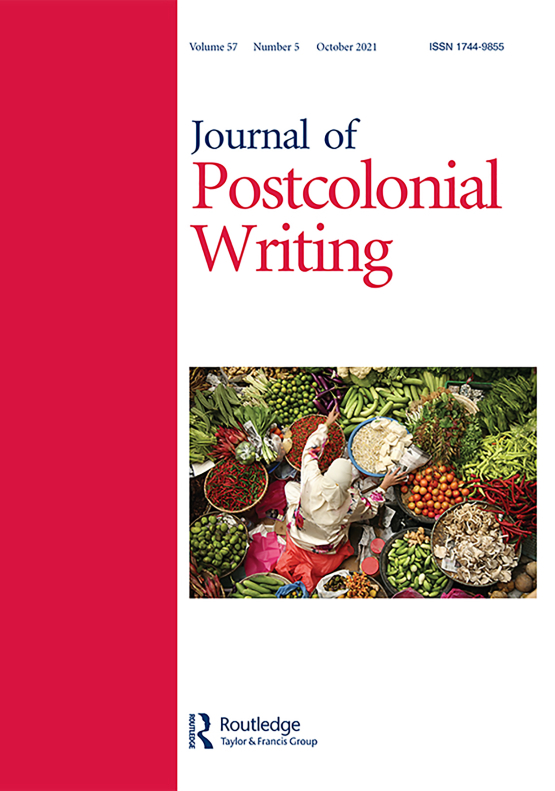Submit a Manuscript to the Journal
Journal of Postcolonial Writing
For a Special Issue on
Telling the Story of Oceans and Archives: Rethinking the Novel Form
Abstract deadline
Manuscript deadline

Special Issue Editor(s)
Sunayani Bhattacharya,
Associate Professor, Department of English, Saint Mary's College of California
sb40@stmarys-ca.edu
Lanya Lamouria,
Professor, Department of English, Missouri State University
LLamouria@missouristate.edu
Telling the Story of Oceans and Archives: Rethinking the Novel Form
The novel as a genre has usually been credited with travelling well. Whether as part of Macmillan’s Colonial Library transporting British classics to Indian readers, or in offering object lessons disseminated in Francophone Africa, the novel seems to be the ever-present marker of colonial encounters. The ideological stakes of these encounters have long been recognized in scholarly examinations of the novel as an instrument of power. Yet how these transoceanic movements that took the novel from Europe to its colonies reshaped the genre is a story that is still underexplored.
This special issue situates the postcolonial novel, broadly construed, at the juncture of two distinct yet related fields: transoceanic studies and archival studies. The transoceanic paradigm connecting Europe and its former colonies has been integral not just to the dissemination of the novel, but to the contours of the genre itself: nowhere is this history of engagement better documented than in colonial archives (Joshi, In Another Country). It should thus come as no surprise that many colonial/postcolonial novelists (Perkins, Sansay, Ghosh, Gurnah, von Reinhold, Vassanji, among others) write metaliterary fictions preoccupied with the oceanic systems that carried the novel from Europe to its colonies and with the archives–secret and known, speculative and actual–that promise access to places and people lost to history. These novelists are preoccupied with what we term “the transoceanic archive”. When we view the novel through a transoceanic and archival lens, we attend, most obviously, to state archives documenting the global political and commercial networks that connected the Atlantic, Pacific, and Indian Oceans—networks through which the novel traveled, and that shaped its materiality and literary history. But the conjunction of the transoceanic and the archival also destabilizes understandings of the archive itself. The transoceanic archive is composed of overlapping transnational layers; it is literally in transit (Hofmeyr, “The Complicating Sea”). Thus, while the transoceanic frame allows us to see how the novel travelled from Europe to its colonies, and also between colonies, the archival approach captures traces of these travels, discernible within the novels themselves, as well as existing in the maritime archives. By juxtaposing these two analytical frameworks, we hope to understand what happens to the generic form of the novel as it travels across the seas and encounters official and unofficial archives, and the extent to which the novel itself takes on the task of archiving these transoceanic journeys.
This special issue looks at how the novel drew on these archives for inspiration, took on the task of archiving lost and untold histories, and used the idea of reclaiming narratives to reconcile with its transoceanic travels. We welcome contributions that explore exemplary texts, literary-historical inflection points, historical trajectories, or transnational dynamics in Anglophone and Anglophone-adjacent novelistic traditions. We particularly look forward to submissions that place these questions within the context of the 19th and 20th centuries. In challenging Eurocentrism, this special issue will prioritize contributions from and about the Global South, which we define as encompassing the indigenous North.
Among the topics that contributors might explore are the following:
- Maritime histories in engagement with novelistic traditions
- Archival histories of the novel's production, dissemination, or reception
- Pacific, Atlantic, or Indian oceanic world in relation to novel history
- Primary source materials in the literary history of the novel
- The novel form, epistolarity, and transoceanic correspondence
- Oral narrative (or other non-written narrative) and longform prose as novelistic genres
- Translations and transmedial adaptations of novels
- Strategies for decolonizing the novel
- Aesthetic experimentation and the limits of the novel as a form
Submission Instructions
Please send an abstract (150 words) and a short author bio by November 15, 2025, to Sunayani Bhattacharya (sb40@stmarys-ca.edu) and Lanya Lamouria (llamouria@missouristate.edu). Final papers (6,000 - 8,000 words) due May 30, 2026. Anticipated issue publication date 2027.

